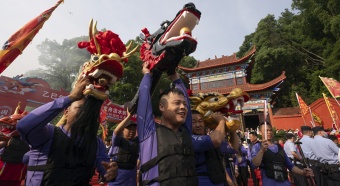The refusal of Japan to express sincere and genuine apology for the atrocities that it has committed during the Second World War has drawn criticisms, particularly in the wake of the passage of security bills in Tokyo that would discard Japan's pacifist constitution.
In an interview with Xinhua, Jose Cortez, a respected political analyst, said that 70 years after the end of the Pacific War, Japan has not fully and unequivocably atoned for its war crimes and brutalities during its invasion and occupation of Asian countries, including the Philippines.
Cortez, who is a consultant of the Media and Communication Research Center (MCRC) of the Universidad de Manila (University of Manila), said that instead of apologizing, Japan is now embarking on a new form of adventurism by shedding off its military's purely self-defense character and expanding it for possible deployment abroad.
On Thursday last week, Japan Prime Minister Shinzo Abe was able to ram through the powerful lower house of the Japanese Diet some controversial bills that opponents say will undermine 70 years of pacifism and could see Japanese troops fighting abroad for the first time since World War II.
According to Cortez, Japan's security measures would threaten the peace and stability of the Asia-Pacific region and would prevent full reconciliation between Japan and its neighbors.
Cortez also cautioned the Philippine government into signing with Japan a visiting forces agreement (VFA) that would allow the stationing of Japanese military forces in the Philippines for joint military exercises similar to the recent joint Japan- Philippines maritime drill held off the seas of Palawan in southwestern Philippines.
He said that what the Philippines should do instead is to scrap the VFA that it signed with the United States so that"the country' s sovereignty and territorial integrity can fully be safeguarded."
A petition has been filed at the Philippine Supreme Court calling for a halt to Philippine-Japan military cooperation. At the lower house of the Philippine Congress, there are also moves to investigate the Tokyo-Manila military alliance which has been done through a mere protocol signed by defense ministers of the two countries and without a formal agreement ratified by the Philippine Senate.
The legislations passed in the Diet, which were strongly opposed by a large segment of the Japanese public, will enable the Japanese military to fight abroad to protect allies even if there is no direct threat to Japan or its people, something previous successive governments have ruled out.
Last week, Beijing has urged caution even as it questioned if Japan was"going to give up its exclusively defense-oriented policy. " "We solemnly urge the Japanese side to... refrain from jeopardizing China's sovereignty and security interests or crippling regional peace and stability," China's Foreign Ministry spokeswoman Hua Chunying said in a statement.
China has frequently warned of the dangers of an unfettered Japan, invoking its destructive invasions and occupations in the first half of the 20th century.
In his book entitled"War, Guild and Politics after World War II, "world-renowned author Thomas U. Berger explained why Japan is viewed as so unrepentant despite the atrocities committed by the Japanese Imperial forces in China during the country's half- century of war and colonial expansion that ended in 1945.
Berger said that a complex web of culture, politics, geography and shifting notions of justice have made it more difficult for the Japanese to apologize for past transgressions than other societies."That's particularly true compared to Germany, whose crimes outstripped even those of Japan, but which has largely reconciled with former victims,"he said.
Berger, who is an associate professor of international relations at Boston University and a frequent traveler to Japan, said"If we have a look at the list of war apology statements from Japan it could appear that Japan has indeed apologized many times for its WW-II atrocities. "However, a better look reveals that Japan has mostly apologized to South Korea and South-East Asian countries, but no proper official apology was issued to China,"he said.
According to Berger, among the 35 war-apology-related quotes by Japan, almost all of them were addressed to South Korea, a few are not directed at any particular country, and very few are addressed to China. "In fact, I only found mentions of China in speeches, and none of them have for main purpose to give a genuine apology, mentioning the massacres, rapes, plunder, sexual slavery and biological experiment on live humans. The emperor has never apologized to China,"Berger said.









